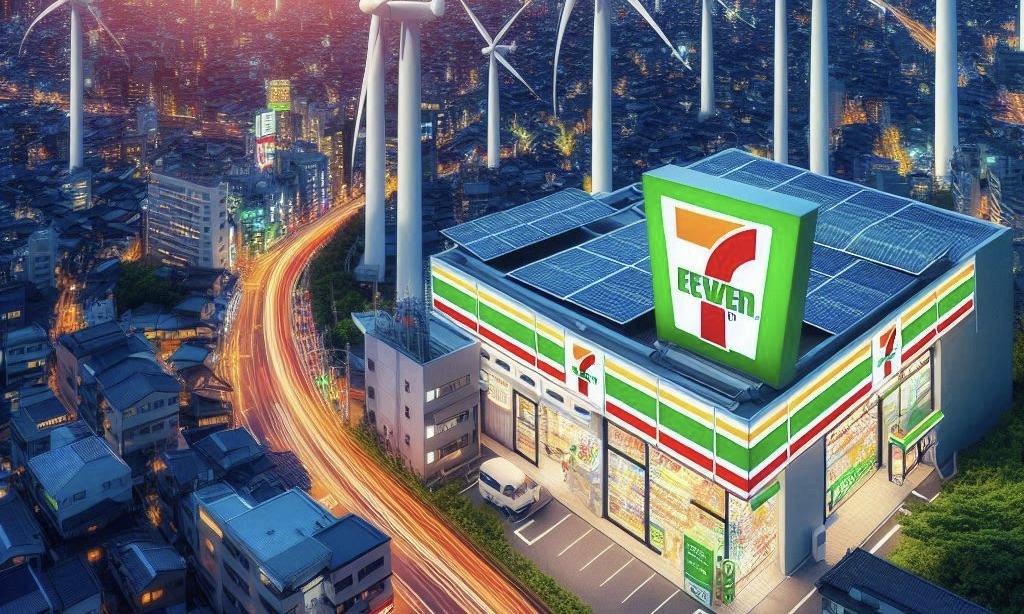Seven & i Holdings is set to enter Japan's electricity retail market in April, launching a new subsidiary to provide renewable power to its 7-Eleven and other group stores. This move aligns with the company’s goal to achieve net-zero carbon emissions by 2050 and significantly increase its use of renewable energy by 2030.
Seven & i Holdings Enters Japan’s Electricity Market, Aiming to Power 7-Eleven Stores with Renewable Energy
Nikkei has learned that Seven & i Holdings is entering the Japanese electricity retail market in April and intends to provide renewable power to its 7-Eleven and other group stores.
To manage the new power business, the retail group established a wholly-owned subsidiary with a capital of 400 million yen ($2.7 million).
The subsidiary will directly source renewable energy from producers, which will be supplied to Seven &'s convenience stores and other businesses through a separate distribution entity.
Mitsui & Co. Plant Systems, a subsidiary of the trading house Mitsui & Co., will be responsible for administering power supply and demand.
Seven & i maintains 23,000 stores in Japan, including Ito-Yokado superstores and 7-Eleven convenience outlets. These stores consume 4 million megawatt-hours of electricity annually, equivalent to 0.4% of Japan's total electricity consumption.
Japan's objective is to attain net-zero emissions by 2050 and reduce greenhouse gas emissions by 46% from the level in fiscal 2013 by fiscal 2030. In the same vein, Seven & i intends to reduce its carbon dioxide emissions by half in fiscal 2030 compared to fiscal 2013 and achieve net zero by fiscal 2050.
Nevertheless, renewable energy is anticipated to account for only 10% of Seven &'s domestic electricity consumption in fiscal 2024. According to Nikkei Asia, the company's objective is to increase the percentage of renewable energy sources to 40% to 45% by the end of fiscal 2030 by establishing a new subsidiary.
Seven & i Secures Renewable Energy Partnerships to Shield Against Market Fluctuations and Rising Costs
Seven & i could protect itself from fluctuations in the electricity market when petroleum prices increase by directly contacting power producers. Signing a long-term contract with a power producer may also be able to negotiate lower rates than it can from significant utility providers.
NTT Anode Energy and Hokuriku Electric Power have constructed solar power facilities exclusively for Seven & i, providing the company with an adequate electricity supply for approximately 400 stores. It will preserve these and other current partnerships with critical utilities.
Several foreign enterprises are also considering Japan's renewable energy producers. A company backed by trading house Itochu has inked a contract with Google to purchase renewable power. A petrochemical corporation, Cosmo Energy Holdings subsidiary, and other entities have a 20-year agreement with Amazon.
As Japan's electricity market continues to liberalize, non-industry actors such as Tokyo Gas, petroleum company Eneos Holdings, and trading house Marubeni are establishing new businesses in the electricity sector. According to the Ministry of Economy, Trade, and Industry, these new enterprises accounted for 17.5% of electricity sales in April.



 FAA Plans Flight Reductions at Chicago O’Hare as Airlines Ramp Up Summer Schedules
FAA Plans Flight Reductions at Chicago O’Hare as Airlines Ramp Up Summer Schedules  Asian Stocks Rise on Nvidia Earnings Boost; Yen Weakens as BOJ Rate Outlook Clouds
Asian Stocks Rise on Nvidia Earnings Boost; Yen Weakens as BOJ Rate Outlook Clouds  Oil Prices Steady as US-Iran Nuclear Talks and Rising Crude Inventories Shape Market Outlook
Oil Prices Steady as US-Iran Nuclear Talks and Rising Crude Inventories Shape Market Outlook  Greg Abel’s First Berkshire Hathaway Shareholder Letter Signals Continuity, Caution, and Capital Discipline
Greg Abel’s First Berkshire Hathaway Shareholder Letter Signals Continuity, Caution, and Capital Discipline  APEX Tech Acquisition Inc. Raises $111.97 Million in NYSE IPO Under Ticker TRADU
APEX Tech Acquisition Inc. Raises $111.97 Million in NYSE IPO Under Ticker TRADU  BOJ Signals Possible April Rate Hike as Ueda Eyes Inflation and Wage Growth Data
BOJ Signals Possible April Rate Hike as Ueda Eyes Inflation and Wage Growth Data  U.S.-Canada Trade Talks Resume as Trump Administration Reviews USMCA
U.S.-Canada Trade Talks Resume as Trump Administration Reviews USMCA  Tokyo Core Inflation Slows Below 2%, Complicating BOJ Rate Hike Outlook
Tokyo Core Inflation Slows Below 2%, Complicating BOJ Rate Hike Outlook  Middle East Airspace Shutdown Disrupts Global Flights After U.S.-Israel Strikes on Iran
Middle East Airspace Shutdown Disrupts Global Flights After U.S.-Israel Strikes on Iran  Gold Prices Rally in February as Geopolitical Risks and Economic Uncertainty Boost Safe-Haven Demand
Gold Prices Rally in February as Geopolitical Risks and Economic Uncertainty Boost Safe-Haven Demand  Gold Prices Steady in Asia, Set for Strong February Gains on Safe-Haven Demand
Gold Prices Steady in Asia, Set for Strong February Gains on Safe-Haven Demand  Trump Touts Stock Market Gains and 401(k) Boost Amid Tariff Uncertainty
Trump Touts Stock Market Gains and 401(k) Boost Amid Tariff Uncertainty  U.S. Stock Futures Fall as Nvidia Drops Despite Strong Earnings; Netflix Jumps 9%
U.S. Stock Futures Fall as Nvidia Drops Despite Strong Earnings; Netflix Jumps 9%  Germany and China Reaffirm Open Trade and Strategic Partnership in Landmark Beijing Visit
Germany and China Reaffirm Open Trade and Strategic Partnership in Landmark Beijing Visit  Lynas Rare Earths Shares Surge on Strong Half-Year Earnings and Rising Global Demand
Lynas Rare Earths Shares Surge on Strong Half-Year Earnings and Rising Global Demand  BlueScope Steel Shares Drop After Rejecting Revised A$15 Billion Takeover Bid
BlueScope Steel Shares Drop After Rejecting Revised A$15 Billion Takeover Bid 































